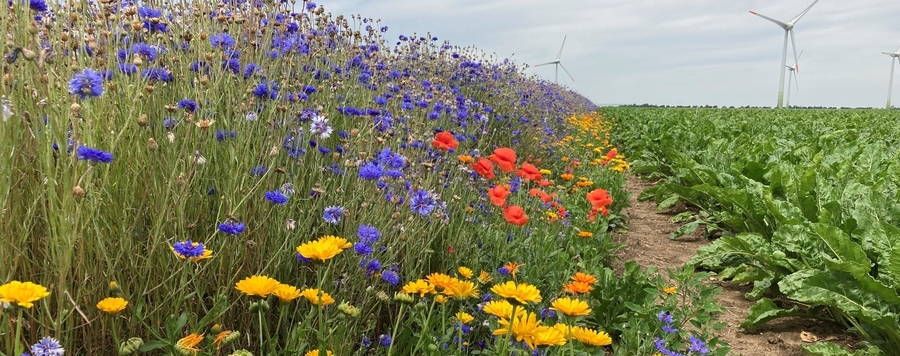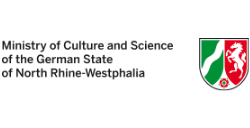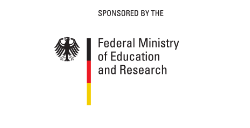Quick facts
Project title:
FlowerBeet (Promoting pest control through in-field flowering strips in sugar beet).
Description
In agricultural production systems, aphid-transmitted plant viruses may cause considerable yield losses. On conventional fields, insecticides are therefore often used to control aphids. The associated negative environmental impacts can be reduced if insecticide use is reduced.
The "FlowerBeet" project is investigating whether aphid infestation in sugar beets can be controlled by enhancing natural enemy population densities. Early infestation with aphids, combined with the transmission of yellows viruses, leads to considerable yield losses in sugar beet. In the project, flowering strips with a width of five meters are planted in the middle or at the edges of sugar beet crop fields. The aim is to enhance populations of beneficial insects for aphid control and to promote biodiversity in agricultural landscapes. The main plants grown in the flowering strip mixtures are native plants such as cornflower, poppy, marigold and red clover. These plant species flower early in the year and thus should attract beneficial insects in early spring.
Previous studies have shown that biodiversity is often higher in flowering strips than in adjacent cropland. Trials with potatoes and in vegetable cultivation with Brussels sprouts showed that beneficial insects can also act against pests over a certain distance into the production area. In the FlowerBeet project, the focus is on estimating the effect of in-field flowering strips in sugar beet fields on aphid biocontrol. The majority of study sites is located in the Rhineland, and there are also some sites close to the city of Göttingen. In the Rhineland, aphid and yellows virus symptoms in sugar beet have been frequently observed in previous years following the ban on neonicotinoid seed coatings. Pest pressure is a prerequisite for reliably recording the effects of flowering strips in terms of beneficial insect promotion and aphid control.
In the fall of 2021, replicate flowering strips were sown inside the fields or at the field edge at a total of more than 20 locations. The development of the flowering plant mixtures as well as the species composition and abundance of beneficial insects and pests in the flowering strips and the adjacent sugar beet areas will be investigated. Finally, potential legacy effects of the in-field flowering strips on the following crop (winter wheat) will be recorded. Trials will be repeated in 2022/23.
The project is intended to provide information on the potential of optimized flowering strip mixtures in sugar beet fields to specifically attract and promote beneficial insects. This would allow to reduce or even replace the use of insecticides to protect sugar beet from virus-transmitting aphids. A final overall evaluation of in-field flowering strips for aphid control forms will be used to develop practical recommendations to farmers and for advisory services. This includes the economic viability of growing in-field flowering strips inside sugar beets. The diversity and large number of study sites under different environmental conditions across two consecutive years contributes to a broad significance of the results. Findings on fundamental interactions can be used to design sugar beet cultivation methods on conventional farms as well as in organic sugar beet cultivation.
The project is lead by the Institute for Sugar Beet Research, Göttingen, in cooperation with the LIB, Museum Koenig Bonn. Supporting partners are Pfeifer und Langen GmbH & Co. KG with the Agricultural Information Service Sugar Beet, the Rhineland Beet Growers' Association and the Plant Protection Service of the North Rhine-Westphalia Chamber of Agriculture. The project is funded by the Innovation Funds Research for Innovations in Agriculture of the “Landwirtschaftliche Rentenbank”.
Location







